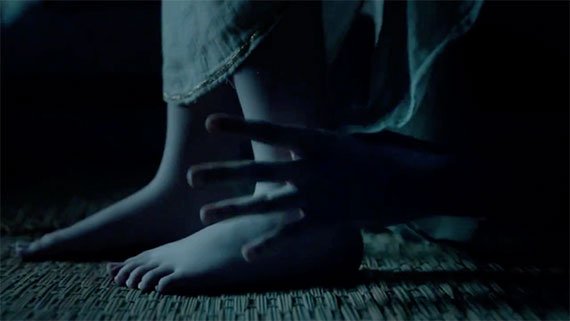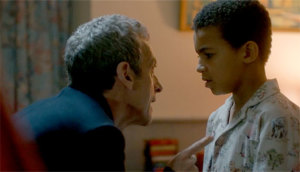“What’s that in the mirror?
Or the corner of your eye?
What’s that footstep following, but never passing by?
Perhaps they’re all just waiting, perhaps when we’re all dead
Out they’ll come
A slithering from underneath the bed?”
WARNING: spoilers!
Summary:
“Listen” opens with Clara coming back from a rather disastrous date with Danny Pink, where she once again insulted his past military career. The two got into an argument, leading to Clara storming out.
She is then summoned by The Doctor, who is convinced that the cryptic chalkboard message that looks suspiciously similar to his handwriting was not actually written by him. The Doctor questions whether the two are actually alone on the TARDIS or whether anyone is ever really alone. This brings up The Doctor’s quest to try to solve an ancient mystery: what kind of monsters live under the bed.

The Doctor reminds us that the nightmare of having a monster under our bed, and even worse, having that monster grab our leg if we try to get up, is a common dream that we have all had. The Doctor suggests that this could mean that the monster is real. Using Clara’s mind and connecting it with the TARDIS’ telepathic link, the two travel to what ends up being Pink’s childhood orphanage. Young Pink’s name was Rupert and he too had a dream that there was a monster living under his bed. Only it’s not a dream at all. Rupert is too afraid to go to sleep because he knows, HE JUST KNOWS that there really is a monster under his bed. He tries to tell the adults but of course they do not believe him. How can they? They don’t see what he sees, they’ve long forgotten the monsters that they encountered when they were his age, part of growing up I guess. But the boy sees and he knows they’re there. Allowing his fear to take the pilot seat of his imagination, Rupert envisions a big scary beast, ready to grab him, stalking, preying, waiting. Perhaps it has enormous claws, sharp as razor blades, perhaps it’s green and spiky, for all he knows, the monster is big, big as a house, no, bigger, just waiting to attack him. Getting back into bed does not seem to be a viable option but checking to see what’s really under there seems to be even worse.
Clara immediately adopts the role of a protector, reassuring him that he has nothing to fear. However, her attempt to show Rupert that there was nothing under the bed does not work as the something, presumably the monster, covered with a blanket appears on top of the bed.
The Doctor attempts to comfort Rupert, asking him if he is afraid. Confirming that the boy really is scared, The Doctor tells him: “Let me tell you about scared. Your heart is beating so hard I can feel it through your hands. There’s so much blood and oxygen pumping through your brain it’s like rocket fuel. Right now you could run faster and you can fight harder. You can jump higher than ever in your life and you are so alert it’s like you can slow down time. What’s wrong with scared? Scared is a superpower! Your superpower!”

The Doctor and crew were able to get rid of the monster by giving it what it wanted – fear. By being afraid of it and not looking at it, by turning their backs on the monster, the monster won and left satisfied. Clara, on the other hand, gets a chance to redo her date with adult Pink, which once again goes terribly wrong. Clara runs into a man in a space suit, who turns out to be Orson Pink, the Earth’s very first time traveler and presumably Danny’s/Rupert’s descendent. Orson spent a long time trapped at the end of the universe, hoping to find some company and afraid that he was not alone there. The Doctor’s curiosity is piqued and he decides to investigate. However, as something out in the nothings begins to knock, The Doctor orders Clara back into the TARDIS. Once she refuses to go without him, he yells at her to “Get back into the TARDIS!” really demonstrating his protective side. The Doctor nearly lost his life when the air system of Orson’s ship malfunctioned. Clara, in a desperate attempt to get them all to safety, connects herself with the TARDIS’ telepathic circuitry again and ends up being transported to a strange barn.
Going out to explore, she finds a bed with a crying boy inside it. Clara initially tries to comfort the boy but is interrupted when they boy’s parents (or perhaps guardians) enter the room, discussing his potential future and stating that he may never become a Time Lord. Clara realizes that the little boy is The Doctor and as he attempts to get up, she grabs his foot from under the bed, becoming the very nightmare that he feared.
In trying to reassure and comfort him, Clara conveys the very message that he later relates to Rupert: “I know you’re afraid,” she says, “but being afraid is alright, because didn’t anyone ever tell you? Fear is a superpower. Fear can make you faster, and cleverer and stronger and one day, you’re going to come back to this barn (referring to the 50th Anniversary Episode) and on that day, you’re going to be very afraid indeed. But that’s OK. Because if you’re very wise and very strong, fear doesn’t have to make you cruel or cowardly. Fear can make you kind.”
Psychology behind this story
Many of us can probably relate to the nightmare of having a monster under the bed, or perhaps in the closet, or just outside our bedroom. And many of us, when we were children, were probably too afraid to check if the monster was actually there, instead relying on our parents or other adults or older siblings to check for monsters. But adults can’t see monsters, everyone knows that, so as children we were left to our own fears, being told that we should not be afraid.
Only a funny thing happens when we tell ourselves that we should not be afraid – we become more afraid. In fact, the more we try to ignore the monster, as The Doctor, Clara, and Rupert initially did, the scarier it becomes. The monster does not go away as we get older. No, as we age, the nightmare too transforms itself from the clearly defined 3-Dimensional beast that shares our bedroom space to more abstract demons, like bills, health, and taxes. We might forget our dear adversary with sharp teeth and razor claws, erroneously reminiscing about the “uncomplicated times,” sometimes becoming the very adult we abhorred, attempting to convince the children that there is no such thing as monsters even as a tiny part of our heart might recognize that this is not the case.
Yet the newly formed army of our fears present new obstacles and we begin to fear everything – we fear failure, we fear success, we fear sadness but alongside it we sometimes fear happiness as well, we fear unpredictability, we fear death, we fear life, we fear fear, and the chances that we are too afraid to take become missed opportunities, yet another fear spawning into life.
In fact, the more important someone or something is to us, the more we will be afraid, afraid that we will lose, afraid that we will fail, afraid that we will somehow mess up things up forever. And what is the end result? We give in to fear, we turn our back on hopes and dreams that mean everything because the risk of disappointment seems too great. We might not talk to the person of our dreams or not apply for our dream job because our fear told us not to. Interestingly, most people at the end of their lives report that they do not regret the silly mistakes that they have made, but rather the chances that they did not take. I wonder, how different would our lives be if instead of being driven by our fear, we instead focused on how we would want to be remembered when we are no longer around. If there was a book or a superhero movie or a Doctor Who episode written about you, about the very decision that scares you to the very bottom of your soul, how would you want that story to play out?
These questions are the essentials of acceptance and commitment therapy (ACT) a type of therapy that I like to refer to as Superhero Therapy. The goal of this type of therapy is to identify the different emotions (like fear) and different thoughts (such as “I will never succeed at this”) that get in the way of us living the kind of life that we want to live, preventing us from being the kind of superhero that we want to be. ACT teaches us to use different skills like acceptance and mindfulness when we feel our emotions or observe our thoughts. Just as The Doctor stated, fear can actually make us stronger, it’s a superpower.
Embracing our fear, like we would embrace a dear friend, ACT would also teach us how to reduce our over-identification with a false identity and instead to become ourselves. For example, some of us might have been labeled by others as “stupid” or “fat” or “a failure.” Not only do these labels hurt, but we often become the very labels that someone else gave us, this is called a Self-Fulfilling Prophecy: when we believe that we are destined to turn out a certain way, we look for evidence that supports this prophecy and also act accordingly, making it come true. But what if the prophecy was false? The labels that we get do not define who we are really. We are so much more than that. If I was to ask everything that’s true about you, “I’m someone who…” the list would probably go one forever. For example, you could say “I am someone who is in a relationship” or “I am someone who is single” you could say “I am someone who likes video games” or “I am someone who likes science fiction.” As you can see, you are not any of these labels alone, but rather all of them put together.
You are probably also someone who values some things more than others, things like friends or family, or perhaps creativity, such as painting, writing, acting, sculpting, you might also value things like video games, books, geeky forums, being altruistic/compassionate, animals, sports, work/school, or other things. Very often we focus too much on one of these values, such as work, ignoring others. Acceptance and Commitment therapy teaches us how to balance the things that are valuable to us in order to give our lives meaning and shape us into the very superhero that we want to be.
And just when we might feel like giving up for good and handing in the keys to our hopes and dreams, The Doctor reminds us to not fear fear, because fear is a superpower, it makes us faster, stronger, giving us the oxygen we need to breathe and adrenalin we need to fight. We can equate this to Batman using his extreme phobia of bats to make him the superhero that he turned out to be. In a sense then, fear can become the very tool in our Bat-utility belt that we need to survive.
In fact, as we begin to get to know our monster, it doesn’t seem as scary. If we get to know the monster, it will not seem as frightening and it might even become our friend. Recent studies show that it is not our fears and stressors that we need to get rid of, it’s our mistaken belief that stress is bad for us, because the more accepting we are of our stress and fears, the better we can cope and the stronger our health might be. My teacher and mentor from Stanford University, Dr. Kelly McGonigal, reminds us in her legendary TedTalk, that stress makes us social, and as we socialize, our bodies pump out a stress hormone, called oxytocin. This hormone, not unlike the blue healing potion in Legend of Zelda, restores our immune functioning and actually alleviates stress, helping us move forward.
And it seems to me that our greatest strength is our vulnerability and while it scares the heck out of us, scarier than an army of monsters under the bed, it is also, the very monster that can become our best friend.
For other reviews of this episode, check out the following links by my amazing colleagues:
Doctor Who Reminds us that anxiety isn’t something to fear, it’s rocket fuel by Dr. Ali Mattu
Doctor Who: “Listen” to your fear by Dr. Travis Langley

Weird coincidence: I’ve just finished watching this episode of Doctor Who and today the book I ordered on building confidence and overcoming fear is by one of the well known proponents of ACT. In two weeks time I finish my year long training in mindfulness. So ACT is seeming prominent for me right now.
I googled the quote about fear being a superpower and I happened to find your page.
Very odd. However I am so pleased to have found your great article. I love it.
A beautifully serendipitous moment.
Mike
Thanks very much, what a great coincidence! 🙂